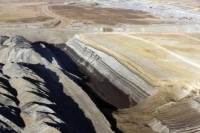The Bureau of Land Management is having a hard time getting rid of our publicly owned coal. For the second time in two months, a federal coal lease auction resulted in no sales.
On Wednesday, the BLM announced that it was officially rejecting the lone bid on the Hay Creek II coal lease tract in Wyoming. The lone bidder, Kiewit Mining Properties, had offered a measly $0.21-per-ton of the estimated 167 million tons of mineable coal in the Hay Creek II tract. The BLM declared that the bid “did not meet fair market value” and rejected it.
Hey, at least we can’t accuse the BLM of literally giving away coal on public lands.
This failure to secure a suitable bid comes on the heels of last month’s stunning news that there were absolutely no bids for the auction of the Maysdorf II tract, also in the Powder River Basin in Wyoming.
If these two failed auctions represent a larger trend, it is that the market for coal has gotten so bad that even the BLM’s bargain bin prices are too high for industry to pay. And, yes, the BLM’s prices are cheap, as they’ve leased over 2 billion tons of coal in the Powder River Basin alone since 2011 at an average of around $1-per-ton.
That price point was criticized in a recent report by the Interior Department’s own Inspector General, which accused the BLM of failing to factor international markets and coal exports into their “fair market values,” and which calculated that for every cent that publicly-owned coal deposits are undervalued, American taxpayers get stiffed by $3 million.
Greenpeace, which has been all over the developments with the Powder River Basin leases – and the export terminal debates in the Pacific Northwest – put out a statement about yesterday’s lowball offer.
“Kiewit’s rock-bottom bid is more evidence that coal markets are undergoing a radical transformation. [he US is moving away from coal in favor of cleaner energy, so the coal mining industry is wary of dumping big money into mines oriented to meet domestic demand. Yet the Bureau of Land Management remains clueless about the rapidly changing coal market and the industry’s increasing focus on coal exports. This should serve as a wake up call to Secretary Jewell to establish a moratorium on new coal leasing.” said Kelly Mitchell, Greenpeace Senior Climate and Energy Campaigner.
Greenpeace isn’t the only organization calling for a moratorium on new coal leases. The fiscally-conservative, nonpartisan Taxpayers for Common Sense released a report just before the BLM’s announcement that also argued for a halt on all pending or new coal leases until the BLM’s lease program is reformed.
“It is outrageous that taxpayers are giving away vast resources at a time when the country faces a protracted budgetary crisis,” said TCS President Ryan Alexander. “BLM has failed to create a system that fosters competition for a valuable public resource by allowing the coal industry to largely control the process of leasing and bidding for this land.”
Alexander added, “Study after study shows that BLM fails to capture a fair return for taxpayers from the mining of federal coal, particularly in the rich coal fields of the American West.”
The New York Times and the Associated Press are shining a light on the weakening global market for coal, even overseas.
So to summarize: the BLM has a leasing program that satisfies nobody. Industry doesn’t want to pay the “fair market value” as determined by the BLM (even if many experts would argue those costs are already too low). Government waste watchdogs criticize the program for giving taxpayers a raw deal. And environmental advocates insist that any “fair market value” for coal would have to include the external costs of climate impacts and air and water pollution.
In this time of declining demand for coal, when industry is hesitant to bid even $1-per-ton for Powder River Basin coal, it seems like a good opportunity for the BLM to take the suggestion of the Taxpayers for Common Sense and Greenpeace and others and put a moratorium on these coal leases until the program is overhauled.
Subscribe to our newsletter
Stay up to date with DeSmog news and alerts






